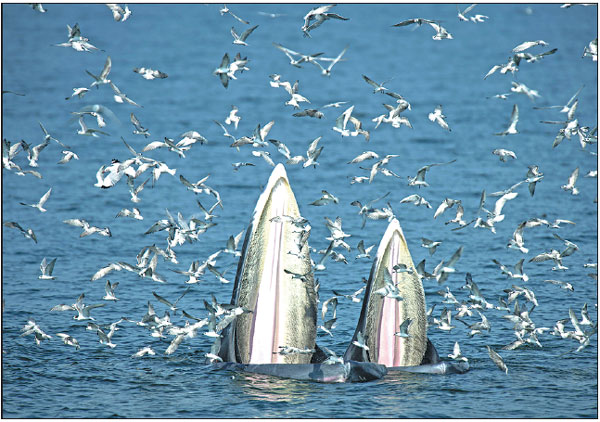Whale of a time for marine tourists
By Agence France-presse in Gulf Of Thailand (China Daily) Updated: 2016-12-14 07:34Enthusiasm grows for new concept but regulation is needed, say campaigners
Piercing the water's surface with its almond-shaped mouth, a giant Bryde's whale opens wide for one, two, three seconds, gulping in anchovies as a boatload of awed tourist look on in the Gulf of Thailand.
It's a rare glimpse of marine life in its natural habitat, in a kingdom overrun with mass tourist attractions such as aquariums and dolphin shows.
Once a dream for scuba divers, many of Thailand's coral reefs have been dulled by pollution, over-fishing and increased boat traffic, as well as over-enthusiastic swimmers.
But going out to spot Bryde's whales is a relatively new concept.
The 15-meter-long mammals flock to the northern Gulf waters to feed on an abundance of anchovies during the September to December rainy season.
Many tourists come out to catch a glimpse of their unique feeding habits - observing the way they keep their mouths agape for seconds at a time.
"The way they eat is the greatest biomechanical event" in the world, said Jirayu Ekkul, who takes groups out on his converted fishing boat to spot the whales just a few hours from the bustling capital Bangkok.
The devoted diver and wildlife photographer's company Wild Encounter Thailand is among only a handful offering whale watching excursions in the Gulf of Thailand.
Heading out on the waters in search of Bryde's whales is a ritual he relishes, and one he hopes won't be lost if whale-watching goes the way of so many other mass tourism attractions in Thailand.
"Commercial whale-watching is new in Thailand, there are no regulations yet," he tells AFP on his boat, which can carry about 40 people.
There are concerns about the impact it has. In the Gulf of Thailand, six whales were found dead this year, which is a sharp spike from the average one death per annum. Surasak blames this increase on the toxic waters, though local media also reported illegal fishing trawlers in the area.
The country, whose economy remains hugely reliant on tourists to keep afloat, has come under fire for letting visitors spoil its natural attractions.
Precious coral are routinely damaged by throngs of scuba-diving tourists, who scrape reefs with their fins or hands in their hunt to spot tropical fish.
"The government is struggling to enforce best practice in terms of tourism," said British marine biologist James Harvey.
He would like to see Thailand embrace green tourism, an increasingly attractive industry among eco-minded travellers.
In collaboration with the United Nations, he founded Green Fins, a program that promotes sustainable diving and snorkelling in Asia to protect coral reefs, and would like to see a more eco-friendly ethos applied in Thailand.
"It makes economic sense to be green now," he said.
|
A female Bryde's whale and her calf feed on anchovies in the Gulf of Thailand, off the coast of Samut Sakhon province. Whale-watching tours are winning fans in a country overrun with mass tourist attractions such as aquariums and dolphin shows.Lillian Suwanrumpha / Agence Francepresse |
- 'Cooperation is complementary'
- Worldwide manhunt nets 50th fugitive
- China-Japan meet seeks cooperation
- Agency ensuring natural gas supply
- Global manhunt sees China catch its 50th fugitive
- Call for 'Red Boat Spirit' a noble goal, official says
- China 'open to world' of foreign talent
- Free trade studies agreed on as Li meets with Canadian PM Trudeau
- Emojis on austerity rules from top anti-graft authority go viral
- Xi: All aboard internet express












